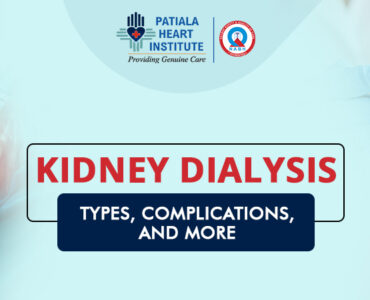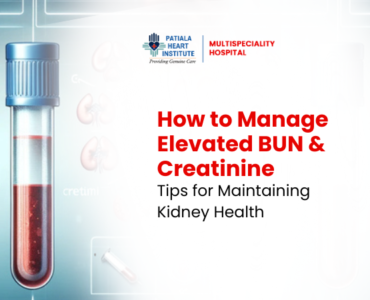An individual suffering from Chronic Kidney Disease (CKD) loses kidney function over a period of time which can thereby lead to kidney failure. In most cases, the condition goes undetected and undiagnosed until it is very advanced.
Approximately 37 million people suffer from CKD. Based on a population study, it was found that dialysis patients in India are growing at a rate of 10-20 percent annually.
As a result of kidney disease, toxic concentrations of waste can easily build up in the body. The underlying causes of kidney dysfunction can be addressed and stopped or slowed down through treatment.
Here’s all you need to know about CKD, including its causes, symptoms, and ways you can lower your risk factors.
What is Chronic Kidney Disease?
Chronic Kidney Disease is defined as an irreversible, progressive disease that destroys the kidneys. Kidneys are one of the most important organs in your body. Among the functions of the kidneys are:
- Supporting the body’s mineral and electrolyte balance, such as calcium, sodium, and potassium
- Keeping your blood’s pH levels balanced
- Getting rid of water-soluble wastes
When the kidneys are damaged, they cannot perform these functions.
Causes of Chronic Kidney Disease
Chronic kidney disease occurs when kidney function is impaired, resulting in progressively more severe kidney damage over a long period.
People of all ages can develop CKD. However, some are more vulnerable than others. CKD is caused by a variety of factors including:
- Type 1 or type 2 diabetes
- High blood pressure
- Glomerulonephritis (gloe-mer-u-low-nuh-FRY-tis), is an inflammation of the kidney’s filtering units (glomeruli)
- Interstitial nephritis (in-tur-STISH-ul nuh-FRY-tis) is an inflammation of the kidney’s tubules and surrounding structures.
- Polycystic kidney disease or other inherited kidney diseases
- Chronic obstruction of the urinary tract, caused by conditions such as enlarged prostates, kidney stones, and certain types of cancer
- Vesicoureteral (ves-ih-Koe-you-REE-tur-ul) reflux, a condition that causes urine to back up into your kidneys
- Recurrent kidney infection also called pyelonephritis (pie-uh-low-nuh-FRY-tis)
What are the ways to lower Chronic Kidney Disease?
Undoubtedly, kidney-related issues are something to get concerned about. So here we have come up with the best ways that will definitely help you lower the risk factors for chronic kidney disease.
Managing Your Diet
Preventing chronic kidney disease requires good nutrition. In addition, regulating cholesterol, blood pressure, and electrolyte levels in the body can reduce the risk of chronic kidney disease.
The number of fresh fruit and vegetables in a diet should be increased alongside the amount of fiber from whole grains consumed. In addition, there is often excess salt in processed foods that contributes to high blood pressure, which should be avoided.
Avoid consuming alcohol
Blood pressure and cholesterol in the blood can be raised by excessive consumption of alcohol. This suggests that moderate alcohol consumption may reduce the risk of chronic kidney disease.
For women, a daily limit of 2-3 standardized alcohol units should be more than enough, while for men, a limit of 3-4 units should be observed.
Exercising Regularly
Regular physical activity decreases the risk of getting Chronic Kidney Disease, as it lowers blood pressure and has other positive health effects.
Exercise at least 30 minutes every day to achieve the desired results.
Avoiding harmful medications
Consuming some medications is known to increase renal burden and increase the risk of chronic kidney disease. Some of these medications include lithium, aspirin, and non-steroidal anti-inflammatory drugs (NSAIDs).
That is why it is always recommended to consult a doctor before taking such medications.
Certain medications that increase kidney load increase the risk of chronic kidney disease. These medications include lithium and nonsteroidal anti-inflammatory drugs (NSAIDs), including aspirin and ibuprofen. Therefore, alternatives should be substituted whenever possible for these medications.
Screening for Abnormal Kidney Function
Most people who suffer from chronic kidney disease can find out about the condition only through routine blood tests or urinalysis because the early stages of the disease are rarely symptomatic.
People with high blood pressure or diabetes are particularly at risk of CKD, so there is a benefit to regular blood and urine examinations to watch for changes. In addition, to prevent kidney disease from progressing, early detection of abnormal kidney function is imperative.
Symptoms of Chronic Kidney Disease
Symptoms of kidney disease are not generally obvious until the disease has progressed to a more advanced level.
In the case of renal failure, there will be an accumulation of fluids, body waste, and electrolytes. In the case of kidney failure, loss of function can lead to the following symptoms:
- Nausea
- Vomiting
- Loss of appetite
- Fatigue and weakness
- Sleep problems
- Urinating more or less
- Decreased mental sharpness
- Muscle cramps
- Swelling of feet and ankles
- Dry, itchy skin
- High blood pressure (hypertension) that’s difficult to control
- Shortness of breath, if fluid builds up in the lungs
It is common for kidney disease symptoms to be nonspecific. In addition, due to the ability of your kidneys to make up for their function when they are damaged, you may not develop signs and symptoms until irreversible damage has been done.
When to see a doctor
Those with kidney disease should see their doctor if they experience any signs or symptoms. If you detect kidney disease early, you might be able to avoid kidney failure.
As a preventative measure, your doctor may perform urine and blood tests on you during office visits if you are at risk of kidney disease. If you need these tests, speak with your doctor.
Patiala Heart Institute: Kidney Specialist Hospital in Patiala
Patiala Heart Institute is the best place to consult the best nephrologists if you notice any symptoms.
As a kidney specialist hospital in Patiala, We have a team of the best nephrology doctors that can provide you with the best treatment. With us, you’re assured of getting the best kidney care.
Frequently Asked Question
What is considered chronic kidney disease?
Chronic Kidney Disease is a condition in which the kidneys are damaged and cannot filter blood properly. As a result, excess fluid and waste remain in the body, which may lead to other health problems, such as heart disease.
Can you stop chronic kidney disease from progressing?
Although chronic kidney disease is generally irreversible, we can slow it down from progressing by consulting the nephrologist, taking a healthy kidney diet, following regular checkups and examinations.








Amazing! This blog looks exactly like my old one! It’s on a completely different subject